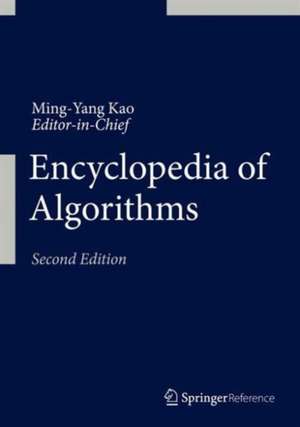Encyclopedia of Algorithms
Editat de Ming-Yang Kaoen Limba Engleză Hardback – 14 mar 2016
This second edition is broadly expanded, building upon the success of its former edition with more than 450 new and updated entries. These entries are designed to ensure algorithms are presented from growing areas of research such as bioinformatics, combinatorial group testing, differential privacy, enumeration algorithms, game theory, massive data algorithms, modern learning theory, social networks, and VLSI CAD algorithms.
Over 630 entries are organized alphabetically by problem, with subentries allowing for distinct solutions. Each entry includes a description of the basic algorithmic problem; the input and output specifications; key results; examples of applications; citations to key literature, open problems, experimental results, links to data sets and downloadable code.
All entries are peer-reviewed, written by leading experts in the field—and each entry contains links to a summary of the author’s research work.
This defining reference is available in both print and online—a dynamic living work with hyperlinks to related entries, cross references citations, and a myriad other valuable URLs.
New and Updated entries include:
Algorithmic Aspects of Distributed Sensor Networks,
Algorithms for Modern Computers
Bioinformatics
Certified Reconstruction and Mesh Generation
Combinatorial Group Testing
Compression of Text and Data Structures
Computational Counting
Computational Economics
Computational Geometry
Differential Privacy
Enumeration Algorithms
Exact Exponential Algorithms
Game Theory
Graph Drawing
Group Testing
Internet Algorithms
Kernels and Compressions
Massive Data Algorithms
Mathematical Optimization
Modern Learning Theory
Social Networks
Stable Marriage Problems, k-SAT Algorithms
Sublinear Algorithms
Tile Self-Assembly
VLSI CAD Algorithms
Preț: 6506.41 lei
Preț vechi: 8133.02 lei
-20% Nou
Puncte Express: 9760
Preț estimativ în valută:
1245.12€ • 1292.57$ • 1038.25£
1245.12€ • 1292.57$ • 1038.25£
Carte disponibilă
Livrare economică 01-15 martie
Preluare comenzi: 021 569.72.76
Specificații
ISBN-13: 9781493928637
ISBN-10: 1493928635
Pagini: 2389
Ilustrații: L, 2389 p. 379 illus., 116 illus. in color. In 3 volumes, not available separately.
Dimensiuni: 178 x 254 x 146 mm
Greutate: 6.62 kg
Ediția:2nd ed. 2016
Editura: Springer
Colecția Springer
Locul publicării:New York, NY, United States
ISBN-10: 1493928635
Pagini: 2389
Ilustrații: L, 2389 p. 379 illus., 116 illus. in color. In 3 volumes, not available separately.
Dimensiuni: 178 x 254 x 146 mm
Greutate: 6.62 kg
Ediția:2nd ed. 2016
Editura: Springer
Colecția Springer
Locul publicării:New York, NY, United States
Cuprins
From the contents: Abelian Hidden Subgroup Problem.- Abstract Voronoi Diagrams.- Active Learning - Modern Learning Theory.- Backdoors to SAT.- Backtracking Based k-SAT Algorithms.- Bargaining Networks.- Cache-Oblivious B-Tree.- Canonical Orders and Schnyder Realizers.- Circuit Placement.-Data Migration.- Decoding Reed–Solomon Codes.- Direct Routing Algorithms.- Edit Distance Under Block Operations.- Engineering Geometric Algorithms.- Enumeration of Non-crossing Geometric Graphs.- Facility Location.- Flow Time Minimization.- Force-Directed Graph Drawing.- Gate Sizing.- General Equilibrium.- Geographic Routing.- Hamilton Cycles in Random Intersection Graphs.- Hardness of Proper Learning.- Huffman Coding.- Implementation Challenge for Shortest Paths.- Incentive Compatible Selection.- Inductive Inference.- Kernelization, Bidimensionality and Kernels.- Kinetic Data Structures.- Knowledge in Distributed Systems.- Large-Treewidth Graph Decompositions.- Layout Decomposition for Multiple Patterning.- Learning Automata.- Majority Equilibrium.- Manifold Reconstruction.- Market Games and Content Distribution.- Nash Equilibria and Dominant Strategies in Routing.- Nearest Neighbor Interchange and Related Distances.- Negative Cycles in Weighted Digraphs.- Oblivious Routing.- Online Interval Coloring.- Online Paging and Caching.- PAC Learning.- Parity Games.- Permutation Enumeration.- Quadtrees and Morton Indexing.- Quantum Algorithm for Factoring.- Quantum Dense Coding.- Radiocoloring in Planar Graphs.- Random Planted 3-SAT.- Randomization in Distributed Computing.- Schedulers for Optimistic Rate Based Flow Control.- Secretary Problems and Online Auctions.- Separators in Graphs.- Table Compression.- Text Indexing.- Triangulation Data Structures.- Unified View of Graph Searching and LDFS-Based Certifying Algorithms.- Universal Sequencing on an Unreliable Machine.- Upward Graph Drawing.- Vector Bin Packing.- Vector Scheduling Problems.- Voltage Scheduling.- Wavelet Trees.- Well Separated Pair Decomposition.- Wire Sizing.
Recenzii
“This is a unique and beautiful encyclopedia; you start reading and cannot find a way to stop because it is so fascinating to move from one article to another with seemingly no end. The expertise of all authors guarantees high quality of most of the articles. They are easily accessible also for readers not working in the respective field and give a quick orientation.” (Klaus Meer, Mathematical Reviews, February, 2018)
Notă biografică
Ming-Yang Kao is Professor of Computer Science at the Northwestern University, Evanston. He got a B.S. in Mathematics, 1978 at the National Taiwan University, Republic of China (Taiwan) and his Ph.D. in Computer Science, 1986, at Yale University, USA.
Prof. Kao studies the design, analysis and implementation of algorithms. His work spans a broad range of applications including bioinformatics, computational finance, electronic commerce, and nanotechnology. Kao's most recent research includes work on DNA self-assembly, variants of the traveling salesman problem, and graph labeling problems.
Kao heads the EECS Computing, Algorithms & Applications Division and is the editor-in-chief of Algorithmica.
Prof. Kao studies the design, analysis and implementation of algorithms. His work spans a broad range of applications including bioinformatics, computational finance, electronic commerce, and nanotechnology. Kao's most recent research includes work on DNA self-assembly, variants of the traveling salesman problem, and graph labeling problems.
Kao heads the EECS Computing, Algorithms & Applications Division and is the editor-in-chief of Algorithmica.
Caracteristici
Covers a wealth of problems currently relevant in diverse fields including biology, economics, financial software and computer science, amongst others Presents accessible, updated and enhanced, A-Z entries with useful cross-references Features examples from growing areas such as bioinformatics and social networks Ensures a balanced coverage through a top-quality, scientifically and geographically diverse editorial board Offers literature references for those looking to study a topic in more detail Includes supplementary material: sn.pub/extras
